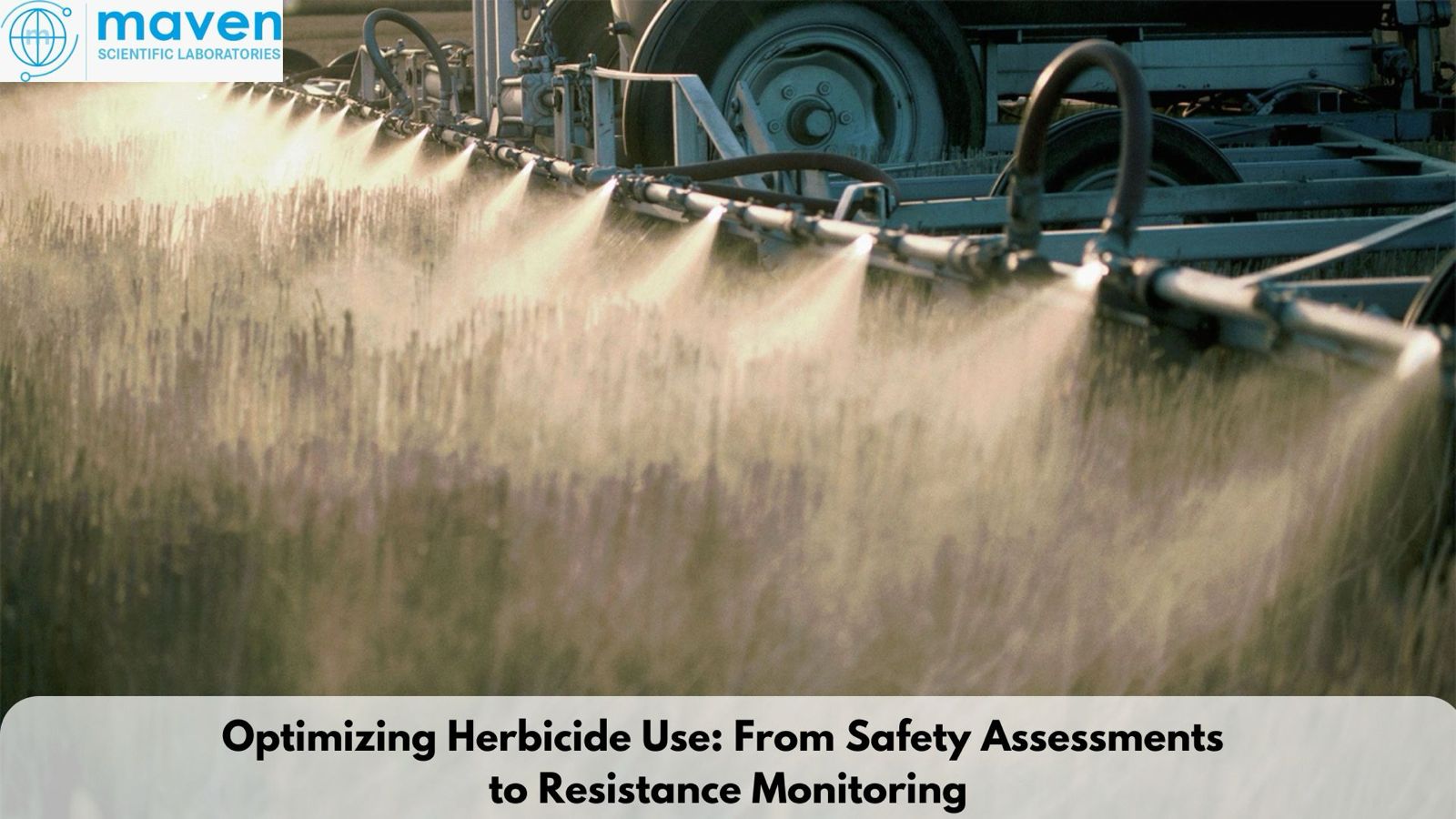
Optimizing Herbicide Use: From Safety Assessments To Resistance Monitoring
Herbicides play a vital role in modern agriculture, enhancing crop yields and maintaining landscapes by effectively controlling weeds. However, their usage demands a careful balance between agricultural productivity, safety, environmental sustainability, and regulatory compliance. Each country imposes unique regulations to ensure herbicides are safe for humans, animals, and ecosystems while remaining effective against target weeds.
At Maven, we understand the intricacies of herbicide management, from toxicological evaluations to navigating complex regulatory landscapes. We specialize in delivering customized solutions that ensure herbicides meet global safety and efficacy standards.
Global Herbicide Regulations
To support herbicide development and management, countries and international organizations have established strict regulatory frameworks:
1. United States
- Regulatory Authority: U.S. Environmental Protection Agency (EPA).
- Key Regulations:
FIFRA (Federal Insecticide, Fungicide, and Rodenticide Act): Governs herbicide registration, labelling, and use.
FFDCA (Federal Food, Drug, and Cosmetic Act): Establishes Maximum Residue Levels (MRLs) for herbicides in food.
- Focus: Protect public health and ecosystems while promoting agricultural innovation.
2. European Union
- Regulatory Authority: European Food Safety Authority (EFSA).
- Key Regulations:
Regulation (EC) No 1107/2009: Covers the approval of active substances and herbicide marketing.
Regulation (EC) No 396/2005: Sets MRLs for pesticide residues, including herbicides.
- Focus: Promote sustainable agricultural practices while safeguarding human and environmental health.
3. India
- Regulatory Authority: Central Insecticides Board & Registration Committee (CIB&RC).
- Key Regulations:
Insecticides Act, 1968: Regulates the import, manufacture, sale, and distribution of pesticides.
Integrated Pest Management (IPM) Guidelines: Encourage sustainable herbicide use.
- Focus: Ensure safe and effective herbicide application in diverse agricultural settings.
4. Japan
- Regulatory Authority: Ministry of Agriculture, Forestry, and Fisheries (MAFF).
- Key Regulations:
Agricultural Chemicals Regulation Law: Governs herbicide safety, efficacy, and environmental impact.
Food Sanitation Act: Sets MRLs for residues in food.
- Focus: Harmonize agricultural productivity with consumer and environmental safety.
5. International Standards
- Organizations:
Food and Agriculture Organization (FAO).
World Health Organization (WHO).
- Key Guidelines:
FAO/WHO Codex Alimentarius: Establishes international MRLs for herbicides to facilitate global trade.
- Focus: Promote safe herbicide practices worldwide.
How Maven Supports Comprehensive Herbicide Management Services
1. Safety Assessment Services
Maven evaluates herbicides for acute and chronic toxicity, carcinogenicity, reproductive toxicity, and developmental risks to humans and animals.
- Human Health Risk Assessments: Address all exposure pathways (dermal, inhalation, oral).
- Environmental Risk Assessments: Examine soil, water, and ecosystem interactions.
2. Advanced Toxicity Testing
Our rigorous testing ensures herbicides meet global safety standards, including acute, chronic, and specialized toxicology tests.
3. Environmental Impact Analysis
- Ecotoxicology Studies: Evaluate herbicides' effects on aquatic organisms, pollinators, and beneficial species.
- Bioaccumulation Risk Mitigation: Prevent ecosystem disruption.
4. Residue and MRL Analysis
Maven ensures compliance with international MRLs through residue analysis in various crops and regions.
5. Resistance Monitoring
We provide strategies to combat herbicide resistance, including integrated pest management (IPM) and herbicide rotation plans.
Regulatory Support Services
1. Regulatory Submissions and Documentation
Maven ensures compliance with regulatory requirements, including dossier preparation and risk assessment documentation tailored to regional guidelines.
2. labelling and Compliance
- Clear Product Labels: Include application instructions, safety precautions, and disposal guidelines.
- Jurisdiction-Specific Solutions: Align with national and international standards.
3. Post-Market Surveillance
- Adverse Effect Reporting: Address safety concerns promptly.
- Performance Analysis: Ensure herbicides meet efficacy standards.
4. Policy Development and Advocacy
- Policy Advisory Services: Shape regulatory frameworks that balance productivity with sustainability.
- Sustainability Advocacy: Promote environmentally sound practices.
5. International Coordination
Maven navigates global regulations, ensuring seamless herbicide distribution and compliance with standards like those of the FAO and WHO.
Why Choose Maven for Herbicide Management?
- Comprehensive Expertise: From toxicological assessments to regulatory compliance, we provide end-to-end solutions.
- Global Reach: Expertise in navigating international regulations ensures seamless market access.
- Sustainability Focus: Commitment to balancing agricultural productivity with environmental protection.
- Customized Solutions: Tailored services to meet the unique needs of manufacturers and regulators.
Conclusion
Maven is your trusted partner in herbicide management, offering tailored services that ensure safety, efficacy, and compliance with global standards. By integrating scientific expertise, regulatory insight, and sustainability principles, we empower industries to achieve their goals responsibly.
Let Maven help you navigate the complexities of herbicide management—ensuring safer, more effective, and globally compliant solutions for modern agriculture and beyond.







